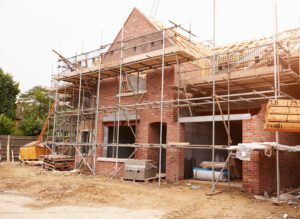<?xml encoding=”utf-8″ ?????????>
The latest data from the National House Building Council (NHBC) paints a bleak picture for the UK’s housing construction industry, with a staggering 20% plunge in the number of new homes built in the first quarter of 2024.
According to NHBC figures, only 26,240 new homes were completed during this period, marking a worrying 13% decrease compared to the same timeframe last year.
New home registrations fared even worse, plummeting by 20% year-on-year to a total of 21,967.
NHBC’s Chief Executive, Steve Wood, attributed these dismal figures to the prevailing market conditions, stating, “Our Q1 2024 figures reflect prevailing market conditions.” Wood highlighted the impact of rising interest rates, with the Bank of England’s base rate hikes driving mortgage rates higher, consequently dampening new home purchases and slowing down house price growth.
Unfavorable weather conditions also played a significant role in hampering construction output, with prolonged wet weather in Q1 causing disruptions across the country. According to the Met Office, the south of England experienced its wettest February since 1836, resulting in rainfall levels well above the historical average in many southern regions.
The housing market has been grappling with the repercussions of the Bank of England’s interest rate hikes over the past three years, culminating in a post-financial crisis high of 5.25% in August last year. This surge in rates led to a corresponding increase in mortgage rates, further suppressing demand.
However, there may be a glimmer of hope on the horizon, as speculation about imminent interest rate cuts suggests a potential improvement in the housing market’s outlook for the remainder of the year.
Despite the overall decline in new home registrations, there is a silver lining in the form of month-on-month increases within the quarter, indicating a potential recovery trend. Moreover, total registrations for the quarter surpassed those of the previous two quarters.
Recent data from the Bank of England also revealed a positive uptick in mortgage approvals, reaching their highest level since September 2022 last month.
Looking ahead, Wood remains cautiously optimistic, stating, “Build volumes are anticipated to rise in the second half of the year as economic conditions begin to improve and consumer confidence starts to recover.”
The stark decline in housebuilding activity comes amidst a national housing crisis, with the average UK home now valued at 8.3 times the average annual salary, a significant increase from 4.5 in 2002. This escalating disparity is largely attributed to the failure to construct new homes, with data from Britain in a Changing Europe revealing a staggering 46% decrease in new house construction between 1970 and 2023.

























